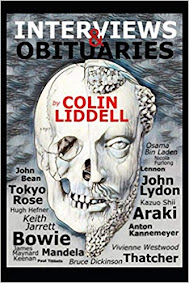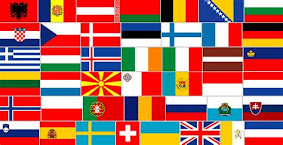April must surely be the most English of months. Not only is it the month when our countryside, our gardens and public parks seem to burst into life, April also witnesses the festival of the patron saint of England, St. George as well as the anniversary of the birthday of the worlds’ most famous poet and playwright, the English Bard himself ; William Shakespeare.
There is another factor which one might interpret as being a significant contribution to the undying spirit of the English nation; a piece of music which is simple in its composition but stunning, almost divine, in its performance.
Although hailing originally from Welsh ancestry Ralph Vaughan Williams is undoubtedly one of the finest English composers this land has witnessed, as well as being an avid collector and interpreter of native English folk music and song. Other notable English composers such as Elgar, Walton, Britten, Bax, Gilbert and Sullivan are all gifted masters of music in their own right but Vaughan Williams seems to grip the nation’s music lovers more than any of his competitors.
His popularity was underscored this Easter weekend with the Classic FM Hall of Fame resulting in a win for Vaughan Williams’ with his masterpiece The Lark Ascending topping the polls in this radio station’s annual competition.
It is both a simple tune but is so quintessentially English. As Vaughan Williams himself described it as "an English landscape transcribed into musical terms."
The work was written in 1914 at the start of a war in which the English, the British and the wider British Empire would play such a pivotal role and one which would change the world forever.
Partly inspired by a poem written by English poet George Meredith, The Lark Ascending starts subtly with hushed strings which introduced the lark in the form of the solo violin.
The soaring violin melody ascends so high into the instrument's upper register that, at times, it is barely audible; shimmering strings, meanwhile, provide much of the beautifully sensitive accompaniment in The Lark Ascending, evoking glorious images of the rolling English countryside. Midway through, Vaughan Williams treats us to an orchestral section that seems to borrow from his love of folk songs; it's not long, though, before the lark returns, with the melody entwining itself around the orchestra and then breaking free, rising to ever loftier heights.
April might well be the month most blessed with the promise of better things to come but us, the English live in an uncertain world when so much we have taken as eternal, solid and predictable is now so often a source of confusion, doubt, pessimism and threat.
For example, today saw the launch of a multi million pound poster campaign by UKIP. The posters simply point out the indisputable fact that the EU is a market place for jobs, trade and labour and that 26 million unemployed EU residents are looking for work in every EU member state, including the UK. The thoroughly non-English Labour MP, Keith Vaz, said UKIP had "lowered the tone of the European debate" and his Labour colleague MP Mike Gapes said the posters were "racist", which must be the most overused epithet by people who cannot summon up a single ounce of evidence to support their ludicrous notions.
Along with every other nation in Europe and beyond, globalisation is a very real threat to the sovereignty and survival of the English. The EU is an assembly of institutions which facilitate globalisation, mass migration, erosion of tradition and identity, loss of sovereignty and as such weakens the existence of nations, including the English.
When times are tough people tend to seek comfort in familiar surroundings. We instinctively seek support from our loved ones; our friends and family in times of personal distress and danger. We instinctively offer support to our kith and kin when we witness their struggle and distress.
As a nation when we sense external threats we seek comfort in what we love and trust. No small surprise that hundreds of thousands of English folk will be marking 23rd April in their own special way and that an English composer tops this year’s Classic FM Hall of Fame with an unmistakably English piece of music.
Listen and indulge in the pure essence of Englishness of the Lark Ascending.
There is another factor which one might interpret as being a significant contribution to the undying spirit of the English nation; a piece of music which is simple in its composition but stunning, almost divine, in its performance.
Although hailing originally from Welsh ancestry Ralph Vaughan Williams is undoubtedly one of the finest English composers this land has witnessed, as well as being an avid collector and interpreter of native English folk music and song. Other notable English composers such as Elgar, Walton, Britten, Bax, Gilbert and Sullivan are all gifted masters of music in their own right but Vaughan Williams seems to grip the nation’s music lovers more than any of his competitors.
His popularity was underscored this Easter weekend with the Classic FM Hall of Fame resulting in a win for Vaughan Williams’ with his masterpiece The Lark Ascending topping the polls in this radio station’s annual competition.
It is both a simple tune but is so quintessentially English. As Vaughan Williams himself described it as "an English landscape transcribed into musical terms."
The work was written in 1914 at the start of a war in which the English, the British and the wider British Empire would play such a pivotal role and one which would change the world forever.
Partly inspired by a poem written by English poet George Meredith, The Lark Ascending starts subtly with hushed strings which introduced the lark in the form of the solo violin.
The soaring violin melody ascends so high into the instrument's upper register that, at times, it is barely audible; shimmering strings, meanwhile, provide much of the beautifully sensitive accompaniment in The Lark Ascending, evoking glorious images of the rolling English countryside. Midway through, Vaughan Williams treats us to an orchestral section that seems to borrow from his love of folk songs; it's not long, though, before the lark returns, with the melody entwining itself around the orchestra and then breaking free, rising to ever loftier heights.
UNCERTAIN WORLD
April might well be the month most blessed with the promise of better things to come but us, the English live in an uncertain world when so much we have taken as eternal, solid and predictable is now so often a source of confusion, doubt, pessimism and threat.
For example, today saw the launch of a multi million pound poster campaign by UKIP. The posters simply point out the indisputable fact that the EU is a market place for jobs, trade and labour and that 26 million unemployed EU residents are looking for work in every EU member state, including the UK. The thoroughly non-English Labour MP, Keith Vaz, said UKIP had "lowered the tone of the European debate" and his Labour colleague MP Mike Gapes said the posters were "racist", which must be the most overused epithet by people who cannot summon up a single ounce of evidence to support their ludicrous notions.
Along with every other nation in Europe and beyond, globalisation is a very real threat to the sovereignty and survival of the English. The EU is an assembly of institutions which facilitate globalisation, mass migration, erosion of tradition and identity, loss of sovereignty and as such weakens the existence of nations, including the English.
When times are tough people tend to seek comfort in familiar surroundings. We instinctively seek support from our loved ones; our friends and family in times of personal distress and danger. We instinctively offer support to our kith and kin when we witness their struggle and distress.
As a nation when we sense external threats we seek comfort in what we love and trust. No small surprise that hundreds of thousands of English folk will be marking 23rd April in their own special way and that an English composer tops this year’s Classic FM Hall of Fame with an unmistakably English piece of music.
Listen and indulge in the pure essence of Englishness of the Lark Ascending.



























